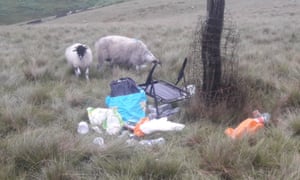Beauty spots and conservation areas are being put at risk by increasing numbers of irresponsible wild campers leaving behind piles of rubbish and lighting fires – with fears growing that the problem could spread as conventional campsites fill up over the summer.
The National Trust, which manages over 780 miles of coastline and 250,000 hectares of mainly open access land in the UK, said that it had seen a huge increase in what it dubbed “fly camping”, where vast quantities of litter and sometimes tents are left behind by illegal campers.
“We are seeing a disposable festival mentality which we’ve not experienced at our places before,” said Ben McCarthy, head of nature conservation and restoration at the National Trust. “This is not only causing us issues with having to spend valuable time clearing up sites – taking our staff away from vital conservation work and engaging with visitors – but also leaving debris and litter behind, which can cause issues for wildlife such as injuring animals and destroying habitats.”
The conservation charity added that some campers were lighting fires even though the land remained very dry. “Fires can easily get out of control – and this could have a massive impact on wildlife and landscapes,” he said.
Councils are also having to cope with rising levels of irresponsible wild camping. Cornwall council’s environment cabinet member, Rob Nolan, said that locals were getting fed up with inexperienced campers turning up without bookings and staying overnight in unsuitable places, in some cases leaving behind piles of rubbish and burying human faeces on beaches.
“This year, some campsites are not opening and others are reducing their capacity by 50%,” he said. “So there are people arriving who find they have nowhere to stay, and they are just camping any old way. They are not equipped for it. We have to clean up the mess they leave behind. There are a lot of them so we are pretty stretched.”
Nolan added that this could get worse over the summer as campsites fill up. “This is not a year where you can turn up in Cornwall and just find some accommodation. We have a big reduction in capacity,” he said.
Both the National Trust and Cornwall Council are keen to distinguish between discreet wild campers – who pitch late in remote locations and go early without leaving any trace of their presence – and larger groups camping in inappropriate places and leaving behind rubbish. Nolan is especially worried about campers without anywhere to stay causing a public nuisance over the summer.
“We don’t encourage it [wild camping] – but we live with it,” he said. “I’m more concerned about poorly-equipped groups and families turning up and pitching right beside the beach or parking camper vans in public parks. It’s just not acceptable.”

Many campsites and caravan parks in popular areas are already close to capacity throughout the rest of the summer. This is leading to concerns that more people could resort to camping without permission on public or private land.
Even remoter parts of the country, which have been used responsibly by small groups of backpackers for years, have had to clamp down on irresponsible camping. Forestry England usually allows people to camp in four specific locations in the 250-square-mile Kielder Forrest in the Northumberland. But last week the government agency banned all wild camping in Kielder after huge quantities of rubbish were dumped by campers.
“It was like a bomb had hit an off-licence,” said Jennifer Watson, a Forestry England ranger, who was involved in the clear-up. “There were eight tents, 16 chairs, eight sleeping bags, a duvet, pillows, a huge amount of booze containers – and there must have been at least 100 nitrous gas containers.”
The agency decided that it had to act because the problem was getting out of hand, with rangers dealing with one to two unpermitted camps a week. Watson, who helped the police break up another party of about eight men camping on a site of special scientific interest near the Kielder Water last weekend, said that she had never known it so bad during her six years working in the forest.
“We were quite happy when the people coming to camp were proper backpackers, who leave no trace,” Watson said. “But at the moment we’re seeing at an increase in campers who don’t know how to respect the countryside.”
o This article was amended on 19 July 2020. An earlier version said the National Trust manages 250 hectares of mainly open access land, when 250,000 hectares was meant.